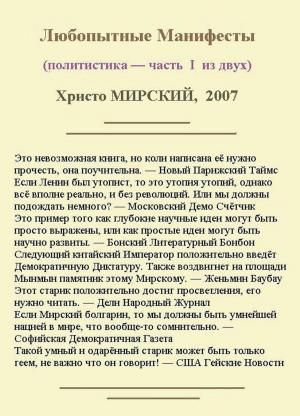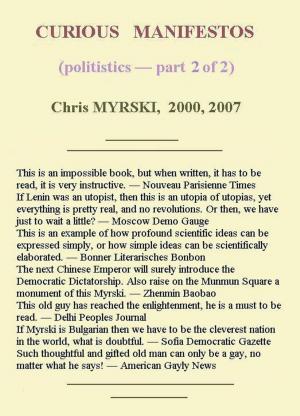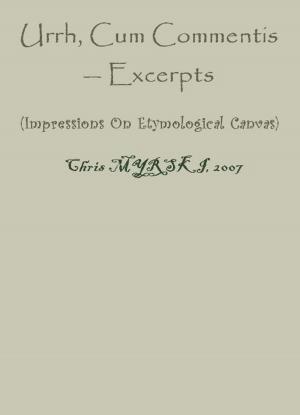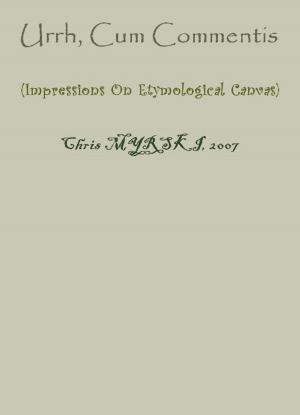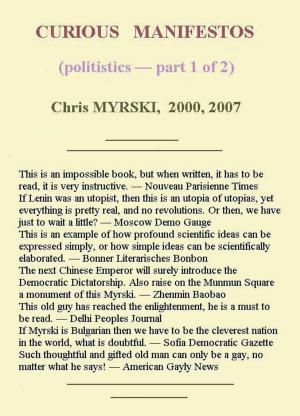Now, Look Here (Publicistics) — Part One
Nonfiction, Social & Cultural Studies, Political Science, Government, Social Policy| Author: | Chris Myrski | ISBN: | 9781370445035 |
| Publisher: | Chris Myrski | Publication: | June 1, 2018 |
| Imprint: | Smashwords Edition | Language: | English |
| Author: | Chris Myrski |
| ISBN: | 9781370445035 |
| Publisher: | Chris Myrski |
| Publication: | June 1, 2018 |
| Imprint: | Smashwords Edition |
| Language: | English |
Here is the major part of the Foreword.
This book contains all my publicistic works, written in the period of Bulgarian transition to democracy, which has begun in 1989, but has not ended for nearly 30 years, judging by our rates of development and the muddle in which we state. Still, even to the year 2000 was accumulated certain amount of things, so that I decided to gather them in one place. Based on the time in which I have written them, it is normally to expect that they will deal mainly with the democratic phenomenon, which is interesting and stable social event (when it exists for more than 25 centuries), but, of course, it does not pose any panacea, that will directly solve our problems (more so because for the present it has led us to a bigger mess), and it surely has its innate and unavoidable, or necessary, drawbacks.
In other words, one constructive, even if in some cases also utopian and idealized, critique must be useful for people, who like to ask themselves questions about the world and the society. And that it is really constructive can be concluded at least by the fact that the author is not related to whatever political or leading economic or other structure, so that he can be maximally unbiased. But he has, of necessity, mainly left-wing political convictions because they, at least for more than a century, happen to be a kind of criterion for healthy reasoning. This is so for the simple reason that our world is unjust and cruel to the isolated and weak individual, and it is a function of society to make it a bit more just and favourable, what is, namely, the quintessence of the “socio”, or the right of the weak. This has been known from deep antiquity, but only in the society of universal prosperity (or post-industrial society, how you name it) it became possible to convert the wishes to reality for the wide population. Or, if you like, just take it that the author is not of the strongest of the day, and when so he sticks to the interests of the weak.
The sequence of the materials is as a rule chronological in the framework of the sections, but the very sections are something questionable, where under materials for journals is understood that these are longer and more serious works, but for the everyday press are needed a bit more “chewed up” things, where one should not ponder much about the matter. The feuilletons is clear what they mean, though to some extent this is a laughter through tears, in most cases, but that is why the satire is invented — to allow us to bear easily the burdens of the everyday life. In the section “Others” are gathered such things which I have not succeeded to decide where else to put (or are of interest for all).
About a dozen things were published in some newspapers, although mainly in abbreviated (and mutilated, I would say) form, many things I have posted to editorial offices and they have remained without reply, but the majority of the materials were written primarily for the pleasure of it (well, and for filling of the time with something, because one “professionally” unemployed has in his disposition a big amount of this special “product”). Of course one should not expect to “discover America” here, but you will most probably find some different from the official press (or propaganda) look, for the reason that the author is not between those people who keep an eye on the media, so that there is no danger for him to begin to say platitudes. Many of the things are not actual today (and other ones will become such with the time), but it, the journalistic work, is, in principle, tied to the moment of activity and is aging fast, what does not mean that the model of reasoning or the conclusions change (i.e., under similar circumstances we will again behave “silly but in our own way”, how sounded one phrase from totalitarian times), and that is why they are left here, to give the readers better possibility to appreciate the author as independent (but really) creative worker.
Here is the major part of the Foreword.
This book contains all my publicistic works, written in the period of Bulgarian transition to democracy, which has begun in 1989, but has not ended for nearly 30 years, judging by our rates of development and the muddle in which we state. Still, even to the year 2000 was accumulated certain amount of things, so that I decided to gather them in one place. Based on the time in which I have written them, it is normally to expect that they will deal mainly with the democratic phenomenon, which is interesting and stable social event (when it exists for more than 25 centuries), but, of course, it does not pose any panacea, that will directly solve our problems (more so because for the present it has led us to a bigger mess), and it surely has its innate and unavoidable, or necessary, drawbacks.
In other words, one constructive, even if in some cases also utopian and idealized, critique must be useful for people, who like to ask themselves questions about the world and the society. And that it is really constructive can be concluded at least by the fact that the author is not related to whatever political or leading economic or other structure, so that he can be maximally unbiased. But he has, of necessity, mainly left-wing political convictions because they, at least for more than a century, happen to be a kind of criterion for healthy reasoning. This is so for the simple reason that our world is unjust and cruel to the isolated and weak individual, and it is a function of society to make it a bit more just and favourable, what is, namely, the quintessence of the “socio”, or the right of the weak. This has been known from deep antiquity, but only in the society of universal prosperity (or post-industrial society, how you name it) it became possible to convert the wishes to reality for the wide population. Or, if you like, just take it that the author is not of the strongest of the day, and when so he sticks to the interests of the weak.
The sequence of the materials is as a rule chronological in the framework of the sections, but the very sections are something questionable, where under materials for journals is understood that these are longer and more serious works, but for the everyday press are needed a bit more “chewed up” things, where one should not ponder much about the matter. The feuilletons is clear what they mean, though to some extent this is a laughter through tears, in most cases, but that is why the satire is invented — to allow us to bear easily the burdens of the everyday life. In the section “Others” are gathered such things which I have not succeeded to decide where else to put (or are of interest for all).
About a dozen things were published in some newspapers, although mainly in abbreviated (and mutilated, I would say) form, many things I have posted to editorial offices and they have remained without reply, but the majority of the materials were written primarily for the pleasure of it (well, and for filling of the time with something, because one “professionally” unemployed has in his disposition a big amount of this special “product”). Of course one should not expect to “discover America” here, but you will most probably find some different from the official press (or propaganda) look, for the reason that the author is not between those people who keep an eye on the media, so that there is no danger for him to begin to say platitudes. Many of the things are not actual today (and other ones will become such with the time), but it, the journalistic work, is, in principle, tied to the moment of activity and is aging fast, what does not mean that the model of reasoning or the conclusions change (i.e., under similar circumstances we will again behave “silly but in our own way”, how sounded one phrase from totalitarian times), and that is why they are left here, to give the readers better possibility to appreciate the author as independent (but really) creative worker.






